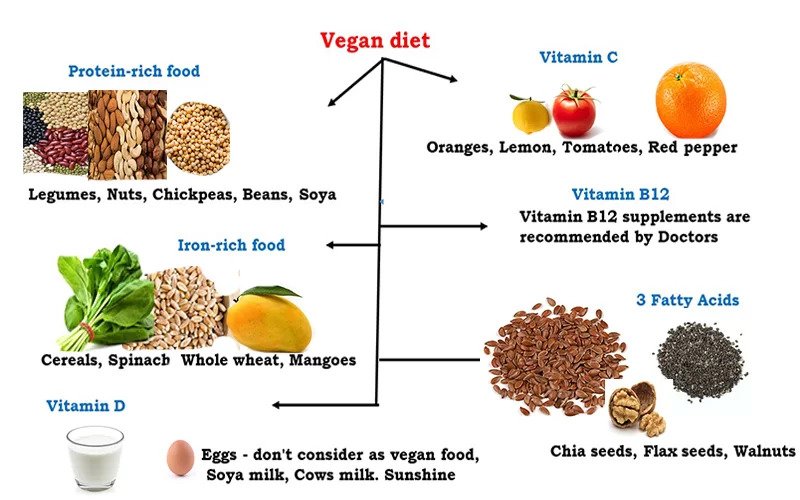Many people are becoming vegan because of the health, environmental, and ethical benefits of eating only plant-based foods. However, there is a misconception that you can’t get all the necessary nutrients on a vegan diet. In this post, we’ll go over the nutrients that you need to pay special attention to and give you some tips on how to get them.
What Supplements Should Vegans Take?
However, if you follow a vegan diet, you should eat complete foods that are high in vitamins and minerals and only take supplements to complement what you don’t receive enough from your diet. Following are the best vegan multivitamins on the market right now:
- Future Kind Vegan Multivitamin is a multivitamin that is essential for vegans.
- Deva Vegan Multivitamin & Mineral Supplement is a vegan multivitamin and mineral supplement.
- Vegans will love Country Life Max.
- Vitamin B12
- Omega 3
- Iron
- Vitamin D
Vitamin B12 Fortified Foods
It is only found in animal products, so it’s important for vegans to make sure they are getting enough of it. Vitamin B12 fortified foods include nutritional yeast, fortified soy milk and meat alternatives such as tofu or tempeh. You can also take a B12 supplement to ensure you are getting enough.
Where to Get Calcium on a Vegan Diet?
Are you worried about getting all of your nutrients on a vegan diet? Here’s the thing: as long as you eat a wide variety of foods, and hit the right (and tasty) combination of proteins, vitamins, and minerals, you’ll be golden.
For example:
Protein: Non-meat protein sources include lentils and beans, whole grains like quinoa or brown rice, and nuts and seeds. In fact, it’s not unusual for vegans to eat twice as much protein as they really need.
Vitamin B12: You can find this vitamin in fortified foods such as nutritional yeast and breakfast cereals, or even in supplements.
Calcium: Dark leafy greens are a good source of calcium. Other calcium-rich foods include calcium-set tofu, fortified plant milk and juices, and some dried fruit like figs.
Iron: Sources of iron include soybeans, spinach, kidney beans, white bread, pumpkin seeds and cashews.
How to Maximize Vegan Iron Absorption?
A few tips to maximize iron absorption? Combine plant sources with vitamin C (like citrus fruits or tomatoes), limit tea and coffee intake with meals (these contain tannins that can inhibit iron absorption), and don’t rely too heavily on whole-grain bread (the phytates
Whether you’re a die-hard vegetarian or considering a lifestyle change, it’s important to get all the nutrients that you need on a vegan diet. It can be hard at first to ensure that you’re getting enough protein, for example, and that you’re getting it from sources of high quality.
If you are going vegan, you may be worried about getting all the nutrients your body needs. It can seem like a challenge to get enough protein, calcium, vitamin B12, iron, omega-3 fatty acids and other vitamins and minerals. The good news is that vegans have a lot of options when it comes to foods they can eat that will help them avoid deficiencies.
Here are some of the issues vegans most commonly have when it comes to their health, as well as strategies for addressing them:
Whether you want to save animal lives, improve your health, or protect the environment, vegan diets can help you achieve all these goals. However, there is a common misconception that it’s hard for vegans to get all the nutrients they need. To make sure that you’re getting enough nutrients on a vegan diet, eat a wide variety of nutrient-dense foods every day. The most important ones are:
Whole grains – Whole grain bread and pasta are rich sources of fibre, B vitamins and many minerals. They also contain protein and healthy fats. Whole grains should be a staple food in any vegan diet, especially for people who don’t eat legumes or soy products regularly.
Beans – Beans are an excellent source of protein and many vitamins and minerals including iron and zinc. They also contain lots of fibre which helps prevent constipation and improves gut health. Other good sources of protein include lentils.
As a vegan, you may be concerned about getting all the nutrients your body needs since you’re not eating animal foods. If you’re worried about deficiencies in your diet and how to maximize your nutrient absorption, we’ve got you covered!
Where Do Vegans Get Their Protein From?
A common question vegans often hear is, “from Where you can get protein?” It turns out that the most popular plant-based sources of protein are actually quite easy to come by. There are many delicious vegan foods rich in protein, including:
●Legumes (lentils and beans)
●Soy products (tempeh, tofu, TVP)
●Nuts and seeds (hemp seeds, almonds, nut butter)
●Grains (oats and quinoa)
So you’re vegan. Great! You’ve made the decision to cut out all animal products to help animals, the environment and your own health. But now you’re worried that you won’t get all of your nutrients. It’s true that certain nutrients can be difficult to get on a vegan diet, but it doesn’t mean that it’s impossible. In fact, vegans are usually able to get almost as much of every nutrient that they need as meat-eaters do – with a bit of extra planning.
Protein is an essential part of our diet. We use it to maintain and repair our muscles, bones and organs. The recommended dietary allowance (RDA) of protein is 0.8g per kilogram of body weight per day – so a person who weighs 70kg needs 56g of protein per day. Even though this might seem like a lot, when you look at the foods that contain protein you’ll see that it’s not really very difficult to hit this target. Some plant-based sources Vegans avoid eating any animal products, including meat, dairy, and eggs.
This means that vegans must find alternative sources for essential nutrients that are commonly found in animal foods. Fortunately, there are several plant-based foods that provide these nutrients. Above we have discussed the supplements that vegans should consider taking, along with the best vegan sources of each nutrient.
How to Avoid Deficiencies in a Vegan Diet?
Although most people who eat meat already don’t get enough nutrients, low nutrient intake can be an even bigger problem for vegans. The reason for that is that most nutrient-dense foods such as meat, fish, eggs, and dairy products are off-limits to vegans. Fortunately, there are several key nutrients that vegans should focus on eating more of. If you’re worried about getting enough nutrients on a vegan diet.
How Do Vegans Get Omega-3?
Just because you’ve made the decision to go vegan doesn’t mean you have to give up on your health. In fact, with a few simple tips and tricks, you can make sure that your diet is as healthy and well-rounded as it can be. If you have been diagnosed with low iron levels, consider adding pumpkin seeds and spinach to your dinner salad. If you have been diagnose with low calcium levels, include leafy greens (e.g., kale) in your dinner salad and drink fortified soymilk at breakfast or in smoothies.
For snacks, choose protein-packed items like nut butter on apple slices or hummus and carrot sticks. It’s true that being vegan can put you at risk for nutritional deficiencies. But with a thoughtful approach, it’s easy to avoid them. There are a number of nutrients that are more difficult to obtain on a vegan diet. But the good news is that they’re all readily available in various plant-based foods and supplements. These nutrients include:
- Vitamin B12: found in supplements or fortified foods
- Omega-3 fatty acids: found in walnuts, chia seeds, and flaxseeds
- Calcium: found in leafy greens, tofu made with calcium sulfate, and fortified plant milk
- Iron: found in lentils, spinach, and fortified foods
- Protein: found in soy products like tofu and tempeh; legumes like beans and lentils; nuts; seeds; whole grains; and veggies like broccoli and Brussels sprouts.



